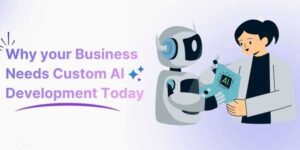
In the fast-paced world of technology, few concepts have captured the imagination, such as artificial intelligence (AI). As artificial intelligence develops, it presents chances to revolutionize sectors like software development.
AI and the end of software development as we know it is fast approaching reality rather than far-off fiction. This article investigates the consequences of this seismic change and how artificial intelligence is transforming the scene of software development and turning conventional programming methodologies extinct.
Table of Contents
The Evolution Of Software Development:
Examining software development’s growth first helps one grasp how artificial intelligence influences this process. For decades, the human-centric activities of developing code, testing, debugging, and deploying software have dominated the production of apps that propel the digital world, software developers have depended on programming languages, integrated development environments (IDEs), and several frameworks.
However, the complexity of contemporary software systems, the requirement for fast deployment, and the need for scalability have stretched the bounds of conventional development approaches. AI’s entry into this equation presents a paradigm change expected to simplify, automate, and improve the software development lifecycle of AI software development companies.
AI’s Role In Automating:
Automation of code production is among the most significant ways artificial intelligence is changing software development. Developers used to create lines of code laboriously, often spending several hours on jobs needing exacting attention to detail.
This automation announces AI and the end of software development. Developers may depend on artificial intelligence to convert high-level instructions into workable code instead of becoming masters in many programming languages. This change democratizes software creation, lowers the entrance barrier for future developers, and saves the time needed to create apps.
Enhancing Software Testing And Debugging:
Software testing and debugging are other necessary fields in which artificial intelligence causes waves. Conventional testing techniques call for creating significant test cases, executing them manually or via automation scripts, and then examining the outcomes. This is a time-consuming technique prone to human mistakes most of the time.
Much of the testing may be automated using artificial intelligence (AI), which can spot trends and examine enormous volumes of data. Test cases, user interaction simulations, and even prospective issue predictions before they appear in the code can be developed using AI-driven testing tools. Faster and more dependable software releases follow from this capacity, significantly lowering the time and effort needed for testing.
As AI manages testing and debugging, we see yet another side of AI and the end of software development as a human-dominated activity. Generative AI systems can manage increasingly complicated situations as they become more sophisticated, lowering the need for human involvement in testing.
The Rise Of No-Code And Low-Code Platforms:
Another element of the artificial intelligence revolution in software development is the rise of low-code and no-code platforms. Instead of writing code, these systems let users create apps using visual interfaces by dragging and dropping components.
These systems depend heavily on artificial intelligence as it allows autonomous code development and provides recommendations for besting application performance. For companies and organizations, these platforms mark AI and the end of software development as a specialized ability.
Today, non-developers can only develop completely working apps if they know the nuances of programming. This democratization of software development empowers more individuals to realize their ideas, stimulating innovation and creativity.
AI-Driven Customization And Personalization:
Apart from automating code creation and testing, artificial intelligence promotes customizing and personalizing software development. Modern apps often have to accommodate different user wants and preferences.
Hence, developers must provide many iterations or configurations of the same program. This procedure is prone to mistakes and may be somewhat labour-intensive.
Generative AI systems may examine user preferences, behaviour, and data to create tailored software versions on their initiative. Whether customizing user interfaces, maximizing performance for specific devices, or providing tailored content, artificial intelligence helps creators build unique experiences free from human coding.
This capacity to scale-tailor software signals another turning point in AI and the end of software development as a one-size-fits-all effort. AI handling customizing allows developers to concentrate on higher-level responsibilities in the specifics of particular user needs.
Ethical Considerations And Challenges:
Although the developments in AI-driven software development are remarkable, they also bring serious ethical questions and issues. The possibility of bias in AI-generated code raises one of the most urgent issues. AI systems learn from past data; hence, if that data includes prejudices, the generative AI may either reinforce or magnify such prejudices in the code they produce.
Furthermore, the move to AI and the end of software development can cause unemployment for conventional programmers. The requirement for human developers may drop as artificial intelligence dominates more facets of the development process, raising questions about employment and career direction.
To meet these obstacles, developing transparent, explainable, and responsible artificial intelligence systems is vital. Necessary first measures in reducing the hazards connected with this technical change include guaranteeing variety in training data, using strict testing procedures, and creating ethical rules for artificial intelligence in software development.

The Future Of Software Development With AI:
Looking forward, the ideas of AI and the end of software development are much more fascinating. Though artificial intelligence is already making significant advances in automating and improving many facets of the software development lifecycle, its promise is far from entirely realized.
Complete automation of software development, when artificial intelligence systems manage everything from conception to deployment, is one potential future situation. Under this scenario, human developers would have more of a supervisory or strategic role, guiding generative AI systems and guaranteeing that the software conforms with ethical norms and corporate objectives.
Integrating artificial intelligence with other developing technologies, including quantum computing, is another prospect. New degrees of processing capability made possible by quantum computing will enable artificial intelligence to solve issues and create code in hitherto unthinkable methods.
This combination of artificial intelligence and quantum computing might accelerate the rate of invention and bring about AI and the end of software development in ways we cannot now forecast.
Implications For The Software Development Industry:
Beyond individual developers, the effect of AI and the end of software development will be felt across the whole software development sector. Businesses that embrace artificial intelligence-driven development will probably acquire a competitive advantage by providing goods quicker, with fewer mistakes, and at a lower cost.
With more prominent companies able to invest in AI technology overtaking smaller rivals, this change might result in a sector concentration. The sector will also have to fit fresh business models.
Companies may have to reconsider how they sell and provide software as artificial intelligence dominates more of the development process. As the business changes, subscription models, artificial intelligence-as-a-service products, and other creative ideas could find more common use.
The idea of AI and the end of software development redefine roles and responsibilities rather than implying the absence of human participation. Developers will use their advantages and offset their drawbacks by working with artificial intelligence systems. More creative and effective software development techniques from this cooperation will eventually help end users and developers equally.
Conclusion:
It is a strong and transforming concept to consider AI and the end of software development. As artificial intelligence develops, it will surely change the scene of software development by automating jobs hitherto the exclusive responsibility of human engineers. This change offers possibilities and difficulties that call us to rethink industrial methods, software development, and education.
Using artificial intelligence as a tool for creativity and teamwork will provide unthinkable opportunities for AI software development companies. The requirement of human creativity, ethical supervision, and strategic thinking will always be crucial, even if the conventional job of the software developer could alter.

 About the Author:
About the Author:












Be the first to write a comment.